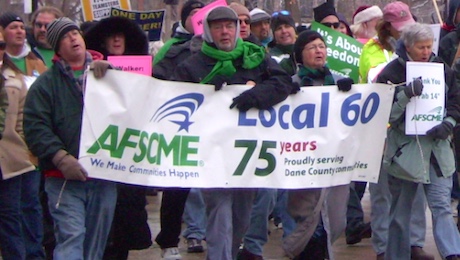By David Flemming
The Supreme Court decided to hear a case, Janus v. AFSCME, about whether or not government employees can be forced to pay “agency fees” (payments in lieu of dues) to unions of which they are not members. In the 1977 Supreme Court Case Abood v. Detroit Board of Education, the Court decided that government unions would be allowed to collect “agency fees” from non-union government employees in order to pay for collective bargaining. If the Court rules in favor of Janus, 5 million government workers — a number of whom are Vermont teachers and state employees — would be able to opt out of union fees and still keep their jobs.

If the Supreme Court rules in favor of Janus, 5 million government workers — a number of whom are Vermont teachers and state employees — would be able to opt out of union fees and still keep their jobs.
A little background. Mark Janus was a child-support specialist at the Illinois Department of Healthcare Services. When a federal judge told Illinois Gov. Bruce Rauner that Rauner could not bring forth a lawsuit challenging agency fees on behalf of Illinois government employees, Janus decided to step in as plaintiff in the case. A federal judge ruled against Janus, invoking Abood in the decision. But Janus appealed to the Supreme Court, and on Thursday the Court agreed to hear his case.
Just two years ago, a group of California teachers took a similar case to the Supreme Court, and it looked like they would prevail. But after Justice Antonin Scalia died in February 2016, the court split 4-4, leaving the Abood decision in place. Recently appointed Supreme Court Justice Neil Gorsuch has been compared to Scalia, making it likely that he will side with Janus and cast the deciding vote in favor of the public sector employees.
The Janus case has the potential to significantly impact Vermont. In 2013, Gov. Peter Shumlin, in what was largely seen as a payoff to the politically powerful teachers union, signed a bill imposing mandatory agency fees on 2,600 Vermont government employees who were not members of a union. Most of these employees were low-wage support staff who could ill afford the financial hit. But, for the past four years, they have been forced to pay 85 percent of union dues and are not even given a vote on union matters.
The Vermont NEA planned to use that 2013 law in a cynical scheme to extract agency fees from non-union childcare workers — who mostly were self-employed small business people — before another Supreme Court case, Harris v. Quinn (2013), put an end to it. Former Vermont union leader Ben Johnson describes this diabolical plan in his remarkable essay, Forced Dues Dooms Big Labor:
We knew we would never see more than probably 10-20% of them (childcare providers) sign up as members. They were spread across the state, house by house. … We would never be able to really create an organization out of that. If it were going to work, we would need agency fees baked in.
This should be a comforting “light at the end of the tunnel” for Vermont’s teachers and government employees. Should the Supreme Court rule broadly in Mr. Janus’ favor, Vermont’s 2013 law would become null and void, giving them the freedom to decide for themselves if paying dues to a union is worth it or not.
David Flemming is a policy analyst for the Ethan Allen Institute. Reprinted with permission from the Ethan Allen Institute Blog.



Wrong headline. It should read “SCOTUS case Great News for Vermont Taxpayers” (maybe people will stop leaving)
Unions no longer are needed. They have become a money hungry association and an arm of the democrat party. they are more damaging to the people they claim to represent.
When Evergreen Freedom Foundation won a four year legal battle in Washington State, that freed teachers from mandatory membership in the WEA union, WEA membership fell from 100% to 8% (that’s “eight”). Shows how valuable the teachers thought their unoin was.
This is the death knell for the Jackass Party and the back cracking of the unions.When the money stops flowing into the coffers, the power ceases to exist. With that goes the corruption; no more ability to buy and sell puppetry in the Statehouse.
At one time unions had a place; now they’re a pestilent abode of the Progressive Red Menace aka, Bernie’s Buddies.
Freedom of Association sounds familiar to me.
I’ve heard that somewhere, long in the past